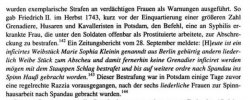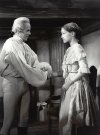nsur1
Governor
[Continued]
“Stop those silly tears,” said the Colonel when she was triced up like the others. “Here, boy, flavor the pear for milady.” To Maria's horror the cold moistened choke was dug up her anus before being placed between her jaws. “Now give her four.” When that was done the Colonel said, “If you shit on the floor you'll get a dozen. When I said shit it out I meant the prick, that's all. Now go to her, Roberts, and let's see her eyeballs pop. Show her what a Grenadier's prick is like. Stuff her to the gills, man, and squirt her full of lead, quick.”
But the stable-boy was exclaiming-“Sir, sir. Hoheit!”
“What is it now? Eh, eh?” Maria Daunitz was weeping, head hung. The Colonel understood. “She a virgin, is that it? Very well, let her take them all up the arse. Ever buggered a virgin, Roberts?” The Count spoke to him in accented English.
“No, Your Grace,” grinned the English lad advancing manfully.
“Ever buggered a boy?”
“Yes, sir.”
“Think you can make this young lady feel full to the gills?”
“Yes, sir.” He advanced even closer, grinning gleefully.
It was happening, it had to happen. Maria closed her eyes, opened them again at the touch of the cockhead nosing her most intimate entrance. No, no… merciful heaven, it could not happen like this. She was aware of Ingeborg on her right, standing straight to attention, expressionless, while to her left Wedell sighed and still rubbed the bruises on her bottom. Then she was lunging in her bonds with a whining grunt-“NGGG!”
The fat prickhead was inside her, swelling her unutterably, then with a couple of lubricating rubs the living limb slid up her-SLUCK! She gave a speechless scream, a soundless arching pant. She felt full up, jammed, every atom of her wanted to expel the monstrous intrusion. She was sweating steadily.
“Get it all up, man. The deeper you get the more you'll feel it.”
“Nnnnghhhhaaaaaah!”
In, out… in, out… two, three… out! Please, please…
It was swelling, inflating… the size was some impossible… air, air, where was air, for God's sake?
“Coming soon, Roberts?”
“Yes, sir.”
“Well, drill her full of it, man.”
Sluck!
“Ggggaooeqw!”
Once, twice, thrice, the shoot of semen thrashed her insides, jerking her straining torso like some fish. Four, five… one last gasping jetting. Then the long length of the pipe was sliding slowly out of her. Maria hung breathless, in utter sobbing relief, dangling like some side of beef.
“Give her brandy.” The neck of a flask rattled at her teeth. Seething fluid burnt her throat. “Now spread her wider, Kurt. That poor devil from England could hardly get in. She's got half a dozen more to take.”
“Shall I liven her up with a couple, Hoheit?”
(No, no, no…!)
“Not necessary, I think, Sergeant-Major. Proceed.”
The second was not so bad, nor the third. After the third she was leaking stained come in driblets to the floor. The fourth was mercifully quick. The fifth and sixth took their frightful time. The last… dear God, the last. But they had left their veritable colossus to the end.
He was not a large man, an Italian judging from his name, but the dimensions of his member as he came forward brought a whistle from even the watching Count.
“Good God, no mule is better set up than that.”
“Hoheit,” came Inge's beseeching on behalf of her friend.
“What's wrong now?”
“She's… virgin!”
The plea received but a guffaw-“Not there, I think.”
The Italian's eyes devoured the curves of the under-ass, saw the thighs twitching either side the dark pink of the tucked quim, then fingered his foreskin back so that the club-like head coned up firmly. His hands cupped under the cheeks, he laved his dong with a shot of spittle and sank into the puckered tissue with a sigh.
Maria beat her fists under his buggering. It was impossible to feel any fuller. The smack of his thighs on her hips as he thudded into her drew stifled wails that turned to gusts in her belly. She was going to be sick, she was going to vomit. The vicious ramming was too much. The column seemed to throb and rise within her guts.
“By Heavens, man, this is what I call buggery!”
Total hysteria took hold of her, then, as the coursing girth grew even greater in her guts, her nostrils flared, sweat streamed down, the cock pounded into her until she felt his hairy belly on her ass. Then she tasted the first fluid of her bile. She began to retch. Helplessly, hopelessly.
It was as if it drew the gism out of her adversary physically. The syrupy stuff surged deep into her, filling her with misery as her mouth overflowed, past the gag, with her own hot filth.
It was a rape, and when he had plucked out of her tender and irritated sphincter she lay in her bonds nerveless, soiled and disgusted, whimpering.
“A rotten exhibition,” said the Count calmly. “Give her eight.” And it was done. “That's better,” he said after the cruel belting, and then Maria knew the worst. He was walking towards her, she felt the sudden throb of his cock at the fringed pink buttonhole of her cunt.
“Noooaaaah!” she managed to exhale.
“I'm on fire for a fuck,” was all he said as he slid into her, felt the tuck of flesh inside vibrate a fraction, and then lunged, spearing her. It was a short lewd come under the spraddled rump and Maria Daunitz hardly knew she had lost her virginity. Her bottom hurt far more from another rod.
She was on her knees. Her senses turned blue-black. There was much stamping and shouting in the room. They had released her and were sloshing water on the floor, sloshing it over her. Ice-cold. On hands and knees she hung her head, gasping. Curd-lets of come oozed from cunt and bum, driblets of bile from her lips; she felt fucked to exhaustion, beaten and buggered, unable so much as to lift her eyes. Her limbs were hung with weights. But no one was paying any attention to her. She had done what was required of her. She had “serviced” the Guards. They were occupied with Wedell again- to be punished, it appeared, for her brief incontinence earlier. All Maria knew was, thank God it wasn't her. No pity. Not pity at all.
Ulrika Wedell was imploring.
“No, no, not th-that… I beseech you… pleease!”
“Grilled Rumpsteak,” the Count was declaiming, wiping his bloody penis, “I'll have mine done three seconds, Sergeant-Major.”
Ulrika Wedell was attached to the “martyr's pole” like the attendant Karl, with the exception that the pad had not been slid up under her pelvic region. She was bared of buttock, legs gripping the upright, knees lightly bent, and face… thoroughly frightened. The whiskery Sergeant-Major stood to the left behind her. Dark weals crossed her hips horizontally.
Suddenly Maria saw it. An upright iron frame was placed below Wedell's broad behind, centrally. From the brazier the youth Karl plucked out with a pair of tongs a glowing grille. This faded quickly but yet was hot enough, when he affixed it to the top rungs of the frame, some six inches under the mistress's base, to make her clench forward to the post in a trembling cry-“NOOOOOO!” A drip of curdled gism from her anus fell on a bar and spat, hissing there. She pressed herself, pleading, to the upright strut. The Count's streaked torn gave a jerk at these manifestations.
“While I count three,” he said pleasantly, feeling it.
The mistress seemed to know what was required of her. Her face became a comedy of concentration, and tortured doubts, as slowly, very slowly, she flexed her knees, lowering her large rump still closer to the hot bars. These were arranged so that they fell vertically, up her arse-cheeks. Maria watched, aghast.
Suddenly contact was made. The striped seat sat on the heated bars and Wedell straightened with a startled jump, screaming. “Auuuu…!”
The Count nodded.
Huish! Huissch!
The long cane wrapped itself beltingly about the startled buttocks. The mistress tried once more. This time she jerked off the inconceivably painful burn with four livid lines inscribed up her hams. Four cuts with the cane followed them. Wedell's bottom was becoming respectably tender.
“I haven't even begun to count, as yet,” drawled the Count watching, his ramrod high. “Thrash her again, Sergeant-Major. I like my meat well done.”
“Wait!”
With clenched teeth and starting eyes Ulrika Wedell lowered her buttocks the little allowed her by her fetters. With a grimace of agony she touched the bars, seemed to lift up, then held herself there. Slowly the Count said, “One.”
Her face screwed up with the effort of self-discipline, fighting down her riotous senses, her temples sweating.
“Two,” said the Commanding Officer gently. He waited an interminable period, then said, “Three.”
Ulrika Wedell fairly hurled herself in one strangled stifled yelp of agony upwards, her body crashing into the upright. Four fearsome blistered burn-marks crisscrossed her cane welts. Her bottom was a cauldron of white-hot coals. Never had Maria Daunitz seen, or imagined, its like before.
In the Army trap back Ulrika Wedell indeed had to kneel on the floor, weeping; she was too tender altogether to sit as yet. Ingeborg put her arm around her friend with a shudder.
“Too bad you lost your cherry,” was what she said.
“I'd sooner have lost ten than been buggered again,” Maria answered. “It was quite the most repulsive evening of my life.”
“Yet in the interests of Prussia,” opined the other passively. “What mammoth pricks,” she said with another shudder, and an undertone of pride.
“What was it he said to you as we left?” Maria asked quietly.
Ingeborg replied gloomily-“The contest. Between us and Wolfenbiittel. It's to take place shortly. And evidently at the barracks.”
“We have to,” said a voice through set teeth, as Ulrika Wedell spoke from the floor, “win!”
“What spirit,” commented Ingeborg Untermacher as she snuggled closer to her friend. Already she was recovering, a gentle warmth stealing over all her body, and there were inchoate delights ahead, when they returned.
“Stop those silly tears,” said the Colonel when she was triced up like the others. “Here, boy, flavor the pear for milady.” To Maria's horror the cold moistened choke was dug up her anus before being placed between her jaws. “Now give her four.” When that was done the Colonel said, “If you shit on the floor you'll get a dozen. When I said shit it out I meant the prick, that's all. Now go to her, Roberts, and let's see her eyeballs pop. Show her what a Grenadier's prick is like. Stuff her to the gills, man, and squirt her full of lead, quick.”
But the stable-boy was exclaiming-“Sir, sir. Hoheit!”
“What is it now? Eh, eh?” Maria Daunitz was weeping, head hung. The Colonel understood. “She a virgin, is that it? Very well, let her take them all up the arse. Ever buggered a virgin, Roberts?” The Count spoke to him in accented English.
“No, Your Grace,” grinned the English lad advancing manfully.
“Ever buggered a boy?”
“Yes, sir.”
“Think you can make this young lady feel full to the gills?”
“Yes, sir.” He advanced even closer, grinning gleefully.
It was happening, it had to happen. Maria closed her eyes, opened them again at the touch of the cockhead nosing her most intimate entrance. No, no… merciful heaven, it could not happen like this. She was aware of Ingeborg on her right, standing straight to attention, expressionless, while to her left Wedell sighed and still rubbed the bruises on her bottom. Then she was lunging in her bonds with a whining grunt-“NGGG!”
The fat prickhead was inside her, swelling her unutterably, then with a couple of lubricating rubs the living limb slid up her-SLUCK! She gave a speechless scream, a soundless arching pant. She felt full up, jammed, every atom of her wanted to expel the monstrous intrusion. She was sweating steadily.
“Get it all up, man. The deeper you get the more you'll feel it.”
“Nnnnghhhhaaaaaah!”
In, out… in, out… two, three… out! Please, please…
It was swelling, inflating… the size was some impossible… air, air, where was air, for God's sake?
“Coming soon, Roberts?”
“Yes, sir.”
“Well, drill her full of it, man.”
Sluck!
“Ggggaooeqw!”
Once, twice, thrice, the shoot of semen thrashed her insides, jerking her straining torso like some fish. Four, five… one last gasping jetting. Then the long length of the pipe was sliding slowly out of her. Maria hung breathless, in utter sobbing relief, dangling like some side of beef.
“Give her brandy.” The neck of a flask rattled at her teeth. Seething fluid burnt her throat. “Now spread her wider, Kurt. That poor devil from England could hardly get in. She's got half a dozen more to take.”
“Shall I liven her up with a couple, Hoheit?”
(No, no, no…!)
“Not necessary, I think, Sergeant-Major. Proceed.”
The second was not so bad, nor the third. After the third she was leaking stained come in driblets to the floor. The fourth was mercifully quick. The fifth and sixth took their frightful time. The last… dear God, the last. But they had left their veritable colossus to the end.
He was not a large man, an Italian judging from his name, but the dimensions of his member as he came forward brought a whistle from even the watching Count.
“Good God, no mule is better set up than that.”
“Hoheit,” came Inge's beseeching on behalf of her friend.
“What's wrong now?”
“She's… virgin!”
The plea received but a guffaw-“Not there, I think.”
The Italian's eyes devoured the curves of the under-ass, saw the thighs twitching either side the dark pink of the tucked quim, then fingered his foreskin back so that the club-like head coned up firmly. His hands cupped under the cheeks, he laved his dong with a shot of spittle and sank into the puckered tissue with a sigh.
Maria beat her fists under his buggering. It was impossible to feel any fuller. The smack of his thighs on her hips as he thudded into her drew stifled wails that turned to gusts in her belly. She was going to be sick, she was going to vomit. The vicious ramming was too much. The column seemed to throb and rise within her guts.
“By Heavens, man, this is what I call buggery!”
Total hysteria took hold of her, then, as the coursing girth grew even greater in her guts, her nostrils flared, sweat streamed down, the cock pounded into her until she felt his hairy belly on her ass. Then she tasted the first fluid of her bile. She began to retch. Helplessly, hopelessly.
It was as if it drew the gism out of her adversary physically. The syrupy stuff surged deep into her, filling her with misery as her mouth overflowed, past the gag, with her own hot filth.
It was a rape, and when he had plucked out of her tender and irritated sphincter she lay in her bonds nerveless, soiled and disgusted, whimpering.
“A rotten exhibition,” said the Count calmly. “Give her eight.” And it was done. “That's better,” he said after the cruel belting, and then Maria knew the worst. He was walking towards her, she felt the sudden throb of his cock at the fringed pink buttonhole of her cunt.
“Noooaaaah!” she managed to exhale.
“I'm on fire for a fuck,” was all he said as he slid into her, felt the tuck of flesh inside vibrate a fraction, and then lunged, spearing her. It was a short lewd come under the spraddled rump and Maria Daunitz hardly knew she had lost her virginity. Her bottom hurt far more from another rod.
She was on her knees. Her senses turned blue-black. There was much stamping and shouting in the room. They had released her and were sloshing water on the floor, sloshing it over her. Ice-cold. On hands and knees she hung her head, gasping. Curd-lets of come oozed from cunt and bum, driblets of bile from her lips; she felt fucked to exhaustion, beaten and buggered, unable so much as to lift her eyes. Her limbs were hung with weights. But no one was paying any attention to her. She had done what was required of her. She had “serviced” the Guards. They were occupied with Wedell again- to be punished, it appeared, for her brief incontinence earlier. All Maria knew was, thank God it wasn't her. No pity. Not pity at all.
Ulrika Wedell was imploring.
“No, no, not th-that… I beseech you… pleease!”
“Grilled Rumpsteak,” the Count was declaiming, wiping his bloody penis, “I'll have mine done three seconds, Sergeant-Major.”
Ulrika Wedell was attached to the “martyr's pole” like the attendant Karl, with the exception that the pad had not been slid up under her pelvic region. She was bared of buttock, legs gripping the upright, knees lightly bent, and face… thoroughly frightened. The whiskery Sergeant-Major stood to the left behind her. Dark weals crossed her hips horizontally.
Suddenly Maria saw it. An upright iron frame was placed below Wedell's broad behind, centrally. From the brazier the youth Karl plucked out with a pair of tongs a glowing grille. This faded quickly but yet was hot enough, when he affixed it to the top rungs of the frame, some six inches under the mistress's base, to make her clench forward to the post in a trembling cry-“NOOOOOO!” A drip of curdled gism from her anus fell on a bar and spat, hissing there. She pressed herself, pleading, to the upright strut. The Count's streaked torn gave a jerk at these manifestations.
“While I count three,” he said pleasantly, feeling it.
The mistress seemed to know what was required of her. Her face became a comedy of concentration, and tortured doubts, as slowly, very slowly, she flexed her knees, lowering her large rump still closer to the hot bars. These were arranged so that they fell vertically, up her arse-cheeks. Maria watched, aghast.
Suddenly contact was made. The striped seat sat on the heated bars and Wedell straightened with a startled jump, screaming. “Auuuu…!”
The Count nodded.
Huish! Huissch!
The long cane wrapped itself beltingly about the startled buttocks. The mistress tried once more. This time she jerked off the inconceivably painful burn with four livid lines inscribed up her hams. Four cuts with the cane followed them. Wedell's bottom was becoming respectably tender.
“I haven't even begun to count, as yet,” drawled the Count watching, his ramrod high. “Thrash her again, Sergeant-Major. I like my meat well done.”
“Wait!”
With clenched teeth and starting eyes Ulrika Wedell lowered her buttocks the little allowed her by her fetters. With a grimace of agony she touched the bars, seemed to lift up, then held herself there. Slowly the Count said, “One.”
Her face screwed up with the effort of self-discipline, fighting down her riotous senses, her temples sweating.
“Two,” said the Commanding Officer gently. He waited an interminable period, then said, “Three.”
Ulrika Wedell fairly hurled herself in one strangled stifled yelp of agony upwards, her body crashing into the upright. Four fearsome blistered burn-marks crisscrossed her cane welts. Her bottom was a cauldron of white-hot coals. Never had Maria Daunitz seen, or imagined, its like before.
In the Army trap back Ulrika Wedell indeed had to kneel on the floor, weeping; she was too tender altogether to sit as yet. Ingeborg put her arm around her friend with a shudder.
“Too bad you lost your cherry,” was what she said.
“I'd sooner have lost ten than been buggered again,” Maria answered. “It was quite the most repulsive evening of my life.”
“Yet in the interests of Prussia,” opined the other passively. “What mammoth pricks,” she said with another shudder, and an undertone of pride.
“What was it he said to you as we left?” Maria asked quietly.
Ingeborg replied gloomily-“The contest. Between us and Wolfenbiittel. It's to take place shortly. And evidently at the barracks.”
“We have to,” said a voice through set teeth, as Ulrika Wedell spoke from the floor, “win!”
“What spirit,” commented Ingeborg Untermacher as she snuggled closer to her friend. Already she was recovering, a gentle warmth stealing over all her body, and there were inchoate delights ahead, when they returned.























